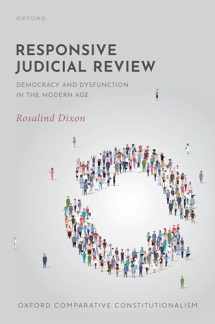
Responsive Judicial Review: Democracy and Dysfunction in the Modern Age (Oxford Comparative Constitutionalism)
Book details
Summary
Description
Democratic dysfunction can arise in both 'at risk' and well-functioning constitutional systems. It can threaten a system's responsiveness to both minority rights claims and majoritarian constitutional understandings. Responsive Judicial Review aims to counter this dysfunction using examples
from both the global north and global south, including leading constitutional courts in the US, UK, Canada, India, South Africa, and Colombia, as well as select aspects of the constitutional jurisprudence of courts in Australia, Fiji, Hong Kong, and Korea.
In this book, Dixon argues that courts should adopt a sufficiently 'dialogic' approach to countering relevant democratic blockages and look for ways to increase the actual and perceived legitimacy of their decisions--through careful choices about their framing, and the timing and selection of cases.
By orienting judicial choices about constitutional construction toward promoting democratic responsiveness, or toward countering forms of democratic monopoly, blind spots, and burdens of inertia, judicial review helps safeguard a constitutional system's responsiveness to democratic majority
understandings. The idea of 'responsive' judicial review encourages courts to engage with their own distinct institutional position, and potential limits on their own capacity and legitimacy.
Dixon further explores the ways that this translates into the embracing of a 'weakened' approach to judicial finality, compared to the traditional US-model of judicial supremacy, as well as a nuanced approach to the making of judicial implications, a 'calibrated' approach to judicial scrutiny or
judgments about proportionality, and an embrace of 'weak DS strong' rather than wholly weak or strong judicial remedies. Not all courts will be equally well-placed to engage in review of this kind, or successful at doing so. For responsive judicial review to succeed, it must be sensitive to
context-specific limitations of this kind. Nevertheless, the idea of responsive judicial review is explicitly normative and aspirational: it aims to provide a blueprint for how courts should think about the practice of judicial review as they strive to promote and protect democratic constitutional
values.


We would LOVE it if you could help us and other readers by reviewing the book
Book review



